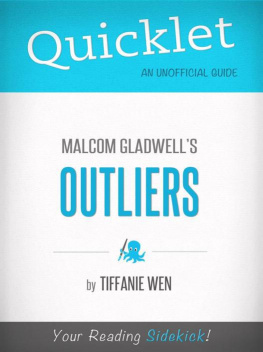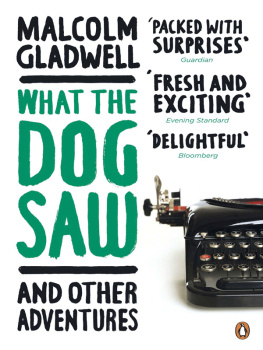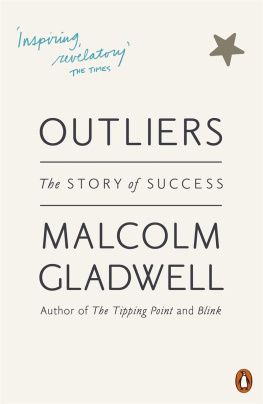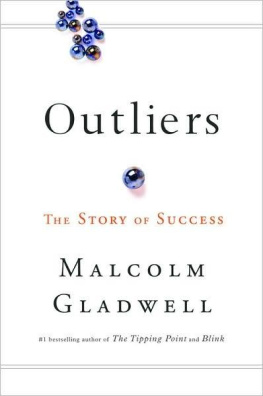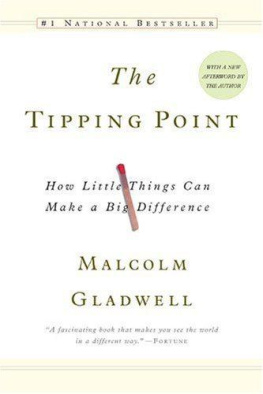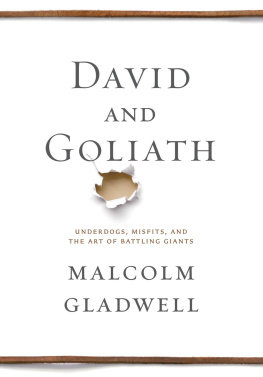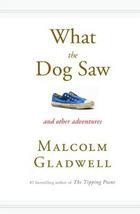I.
Malcolm Gladwell's Outliers
About the Book
The people who stand before kings may look like they did it all by themselves. But in fact they are invariably the beneficiaries of hidden advantage and extraordinary opportunities and cultural legacies that allow them to learn and work hard and make sense of the world in ways others can not.
Following the huge success of his first two books, The Tipping Point and Blink , author and journalist Malcolm Gladwell examines the phenomenon of success in his 2008 hit book Outliers.
Written for a society that increasingly uses intelligence to explain success, e.g. Bill Gates is a genius, Gladwell attempts to reconstruct our notions of outliers, those who are unusually, and extremely successful. He does so by analyzing the stories behind some of the most iconic examples of success: The Beatles, big shot Manhattan attorneys, professional hockey players and of course, Bill Gates.
Gladwell begins each example by reciting the assumed story behind a figures success. Like Bill Gates, who [through] sheer brilliance and ambition and guts builds (Microsoft) into the giant of the software world. The author then re-examines each story in detail, pointing out lesser-known factors that led to success. He bolsters his arguments along the way by citing psychologists, sociologists, researchers and sometimes even the outlier himself.
The book is split into two parts, Opportunity and Legacy, and includes nine chapters. Each chapter begins with a quote from the relevant text.
Though the book debuted at #1 on the New York Times Bestseller list , it also garnered much criticism for including shallow arguments and disappointing conclusions.
About the Author
My grandmother Daisy, to whom Outliers is dedicated, gave my mother the gift of opportunity. My mother has done the same for me.
Born in the UK in 1963, Malcolm Gladwell moved to Canada and attended the University of Ontario. After graduation he moved to New York City, where he worked as a reporter for the Washington Post and later as a staff writer for The New Yorker .
His first bestselling book, The Tipping Point: How Little Things Make a Big Difference was published in 2000 and sold over 800,000 copies worldwide. In it, Gladwell examines the factors that cause ideas to spread through society. In 2005 he published his second book, Blink: The Power of Thinking Without Thinking in which he illustrates how people automatically process information and the effect it has on society. In his third book, Outliers: The Story of Success Gladwell analyzes success and its causes. His fourth book, the 2009 What the Dog Saw, is a compilation of stories he wrote for The New Yorker .
In 2005 the author was featured in Time Magazine as one of the 100 most influential people in the world for demonstrating the practical applications of cutting-edge academic scholarship and helping to make sense of (our world).
Overall Summary
According to Malcolm Gladwell, Bill Gates isnt a genius. Professional ice hockey players werent actually the best athletes growing up. And yes, even the Beatles, arguably one of the greatest bands of all time, are mostly a function of chance and circumstance.
The above statements might ring a little less controversial if we add that, yes, all of the above were good , but to become the best , there were other, more subtle advantages at play.
Gladwell starts with the obvious observation that there is more than meets the eye when behind the successors success; That we cant just rely on our classic rags-to-riches, picked-themselves-up-from-their-bootstraps type of explanations.
Instead, by scrutinizing success stories of some of the most well-known outliers, we can find evidence of hidden advantage and even predict who is most likely to succeed.
We begin with Canadian ice hockey, the purest form of a supposed merit-based system. We assume that those who make it to professional leagues do so because they are the most athletic, the most effective on the ice. But research shows that potential-players have a better chance of going pro if theyre born towards the beginning of the year , due to the arbitrary cut-off date for grade-level athletics .
Even Silicon Valley entrepreneurs like Bill Gates are not immune to secret advantages. Research has shown that it takes 10,000 hours of meaningful practice to become truly expert at something. Bill Gates says himself that he benefitted from an extremely lucky series of events that allowed him to be one of the only people in the world to obtain the amount of programming hours he did by the time the computer revolution began.
And, as we find with the case of Christopher Langan, being a genius does not necessarily guarantee success. The genius, whose IQ is 30% higher than Einsteins, is a college dropout without much prospect for the future.
Again we see a trend in who becomes successful in the case of hotshot New York attorneys. An examination of the family histories of prominent partners at the biggest firms in Manhattan shows that there is indeed a best time to be born for Jewish would-be attorneys. Its 1930.
In the second part of the book, research shows again and again that cultural legacy has lasting effects on the behavior of individuals born into that legacy. It has the power to produce a series of deadly plane crashes and can create a society of people superior in mathematics.
After studying example after example of success, Gladwells conclusion is clear: outliers are not outliers in the sense that they have extreme personal characteristics or high levels of intelligence. They owe their success in large part to lucky advantages that were out of their control, like the date in which they were born.
Chapter-by-Chapter Summary
Introduction: The Roseto Mystery
In Outliers , I want to do for our understanding of success what Stewart Wolf did for our understanding of health.
In his introduction, Gladwell presents us with both the intention of his book and a colorful description of a neighborhood in Pennsylvania that flourished in the early 20th century.
Made up entirely of immigrants from Roseto Valfortore in the Appennine foothills of the Italian province of Foggia, the subsequent Pennsylvania community of Roseto was its own tiny self-sufficient world. That a group of immigrants created a haven for themselves in the US is not particularly anomalous in of itself. What was interesting about the community, as discovered by a physician named Stewart Wolf in the 1950s, was the incredibly low rate of heart disease as compared to the rest of the country.
Wolf partnered with sociologist John Bruhn to investigate the cause of the abnormally low rate of heart disease and was astonished to find that it wasnt diet or exercise or genes or location that accounted for the discrepancy, but Roseto itself . Wolf concludes that Rosetans in 1950s Pennsylvania were particularly healthy because of the egalitarian ethos of the community transplanted from Roseto in Italy.
Gladwell writes that the researchers had to convince the medical establishment to think about health and heart attacks in an entirely new way They had to understand the culture he or she was a part of and appreciate the idea that the values of the world we inhabit and the people we surround ourselves with have a profound effect on who we are and states that, in this book, he intends to do the same for our understanding of success.
Part One: Opportunity
Chapter 1: The Matthew Effect
What is the questions we always ask about the successful? We want to know what theyre

